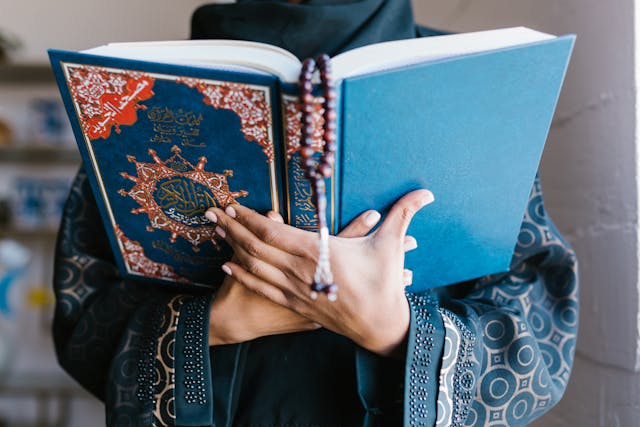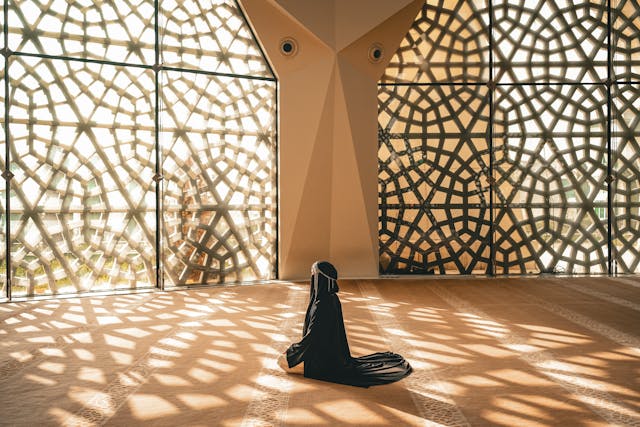Women Rights in Islam

There are a lot of myths and preconceptions around the subject of women’s rights in Islam. Nonetheless, Islamic teachings place a strong emphasis on women’s equality, dignity, and empowerment. We will examine the ideas and applications of women’s rights in Islam in this blog, as well as how Islamic teachings advance social justice and gender parity.
Equality in the Eyes of Allah: Islam essentially affirms that all people are equal, regardless of their gender, color, or socioeconomic standing. The Qur’an makes it clear:
“Whoever does righteousness, whether male or female, while he is a believer – We will surely cause him to live a good life, and We will surely give them their reward [in the Hereafter] according to the best of what they used to do.” (Qur’an, 16:97)
This verse emphasizes that Allah will reward men and women equally for their deeds and that both sexes have the capacity for righteousness. In Islam, devotion and religion determine one’s spiritual worth rather than a person’s gender.
Educational Rights: Islam emphasizes knowledge gain highly, and this applies to both genders. The sayings of the Prophet Muhammad (peace be upon him):
“Seeking knowledge is obligatory for every Muslim.” (Ibn Majah)
This commandment emphasizes the value of education in Islam and is applicable to both men and women. Women have been academics, instructors, and contributors to a variety of knowledge domains throughout Islamic history. Islamic educational institutions have always given women access to education, promoting their intellectual and spiritual growth.
Economic Rights: Islam gives women the freedom to own property, conduct business, and take part in the economy. The Qur’an states:
“And for women are rights over men similar to those of men over women.” (Qur’an, 2:228)
This passage suggests that, in concerns of the economy, women have the same rights and obligations as men. Women are entitled to inherit, manage, and dispose of their fortune on their own accordance with Islamic law. Furthermore, Islam forbids unfairness and exploitation in business dealings, guaranteeing women’s equality and financial stability.
Social and Legal Rights: Islam promotes women’s welfare and protection in society. The Qur’an commands treating women with love, respect, and equity:
“O you who have believed, it is not lawful for you to inherit women by compulsion. And do not make difficulties for them in order to take [back] part of what you gave them unless they commit a clear immorality. And live with them in kindness. For if you dislike them – perhaps you dislike a thing and Allah makes therein much good.” (Qur’an, 4:19)
This passage highlights how crucial it is for married couples to treat each other with fairness, compassion, and respect. Islam upholds women’s rights to security, autonomy, and dignity and forbids behaviors like forced marriage, dowry abuse, and domestic abuse.
In addition, Islamic law offers women legal safeguards concerning inheritance, marriage, divorce, and custody. Even though cultural customs occasionally stray from these guidelines, a sincere commitment to Islamic teachings guarantees justice and equity for women inside the judicial system.
Historical Context: The introduction of Islam in seventh-century Arabia resulted in radical shifts in women’s status. Before the advent of Islam, women were frequently viewed as property, had few legal protections, and had little access to public life, education, and employment. But Islam brought about revolutionary changes that recognized women’s intrinsic worth and dignity and worked to elevate their status.
Challenges and Misconceptions: Even while Islam upholds the ideals of gender parity, there are still issues and false beliefs about women’s rights in cultures where Muslims predominate. In certain situations, patriarchal readings of religious scriptures, cultural customs, and political influences have all led to the marginalization of women. It is critical to discern between true Islamic teachings and cultural customs that could run counter to Islam’s egalitarian and just principles.
Legal Reforms: Significant progress has been made by several Muslim-majority nations in implementing legal changes that strengthen the rights and protections of women. Still, more work has to be done, especially in the areas of family law, inheritance rights, and justice access. To get rid of laws that discriminate against women and guarantee that they have equal rights and opportunities under the law, advocates and legislators must collaborate.
Education and Empowerment: In order to empower women and combat gender stereotypes and injustices, education is essential. In order to advance gender parity and socioeconomic development, it is imperative that girls and women have better access to high-quality education. Initiatives that offer leadership development courses, entrepreneurial possibilities, and vocational training can also enable women to take an active role in the political and economic realms.
Community Engagement and Awareness: In Muslim communities, gender equality needs to be promoted and negative cultural practices need to be challenged through community participation and awareness-raising campaigns. Community activists, academics, and religious leaders can all make a significant contribution to the advancement of inclusive interpretations of Islamic teachings that uphold the rights and dignity of women. It takes cooperation and communication between various stakeholders to promote a climate of gender equality, tolerance, and respect.
Ending Gender-Based Violence: In many countries, gender-based violence persists as a major problem, encompassing sexual harassment, domestic abuse, and damaging customs like child marriage and female genital mutilation. Legislative changes, public awareness campaigns, and survivor support programs are all necessary components of any effort to stop gender-based violence. Promoting attitudes of respect, consent, and nonviolence also requires involving men and boys as allies in the battle against gender-based violence.
International Cooperation and Solidarity: In cultures where Muslims predominate, addressing women’s rights issues calls for international solidarity and collaboration. Global programs like the Convention on the Elimination of All Forms of Discrimination Against Women (CEDAW) and the United Nations Sustainable Development Goals (SDGs) offer a framework for advancing gender equality and women’s empowerment globally. Governments, civil society organizations, and international organizations can collaborate to promote grassroots initiatives and push for legislative changes that advance women’s rights.

Apart from the general societal and systemic obstacles that women's rights face in countries where Muslims predominate, there are particular difficulties that also need to be addressed. Among them are:
- Access to Healthcare: Access to vital healthcare services, such as mental health, maternity, and reproductive health care, may be impeded for women in certain nations with a majority of Muslims. Inadequate infrastructure, a lack of funding, and cultural norms can all have an impact on how differently women receive and use healthcare. Investments in healthcare infrastructure, provider training, and community outreach initiatives to increase knowledge of women's health issues are necessary to address these challenges.
- Political Participation: Islam promotes women's involvement in public life, however in certain nations where Muslims predominate, women may encounter challenges to political engagement, such as legislative limitations, cultural norms, and gender stereotypes. A number of strategies, including quota systems, election changes, and funding for initiatives that create women leaders, are used to support women's political empowerment. Furthermore, promoting women's leadership in religious institutions and opposing patriarchal views can aid in the development of more representative and inclusive political structures.
- Economic Empowerment: Gender equality and the advancement of women's rights depend on economic empowerment. However, there are a number of obstacles that women may have to overcome in Muslim-majority nations, including restricted job options, gender wage disparities, and a lack of property rights. It takes measures like skill-training programs, financial services and credit accessibility, and assistance for female entrepreneurs to empower women economically. More equitable economic possibilities for women can also be created by resolving unfair labor practices and supporting workplace rules that support work-life balance.
- Legal Protections: In many nations where Muslims predominate, women may still experience discrimination and unfairness within the legal system despite legal reforms intended to advance women's rights. Legislative procedures for upholding women's rights must be reinforced, and laws that discriminate against women or do not sufficiently protect their rights must be changed. Programs for legal literacy can also provide women the tools they need to successfully navigate the legal system and demand their rights.
- Ending Child Marriage: In many societies where Muslims predominate, child marriage is still a major problem that negatively affects the health, wellbeing, and educational opportunities of young girls. A comprehensive strategy that supports girls' education and empowerment, community awareness programs, and legal reforms is needed to end child marriage. Achieving long-lasting change requires involving communities and religious leaders in campaigns to question cultural norms that support child marriage.
The matter of women's rights in cultures where Muslims predominate is intricate and multidimensional, necessitating consistent work and cooperation among various sectors. Women's rights have advanced, but there is still more work to be done and obstacles still exist. Through tackling structural obstacles, questioning detrimental cultural conventions, and advocating for comprehensive interpretations of Islamic principles, we can establish communities and civilizations in which women are enabled to assert their rights and make complete contributions to their communities. We may fight toward a future where all women, regardless of their religious or cultural background, are able to live with dignity, equality, and freedom by taking collective action and showing solidarity.

